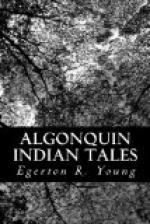“The people received him very kindly, with the exception of one surly, cross old man. They quickly prepared some balsam and put it on his wounded head.
“Nanahboozhoo was well pleased with this kindness, and said that he would be glad to perform for them some kindly act in return.
“Before anyone else, however, could speak the cross old man sneered out:
“’O, if you think you are clever enough to do anything, grant that I may live forever!’
“This request and the sneering way in which it was made caused the quick-tempered Nanahboozhoo to become very angry, and he suddenly sprang up and caught the Indian by the shoulders and violently throwing him on the ground said:
“‘From this time you shall be a stone, and so your request is granted.’”
CHAPTER XXV.
The Dead Moose—The Rivalry Between the Elk and the Moose People, and Their Various Contests—The Disaster that Befell the Latter Tribe—The Haze of the Indian Summer.
The sight of four stalwart Indians dragging on a dog sled the body of an enormous moose on the ice in front of their home very much interested the children.
Nothing would do but they must be wrapped up and allowed to go out and examine it while the men rested and had a smoke. Its great horns, its enormous ugly head, and then its coarse, bristle-like hair, had all to be examined and commented upon. The opportune arrival of Souwanas, who had been attracted by the sight of the moose, much pleased the children, and just as soon as the investigation of the moose was over and the hunters had proceeded on their journey the children insisted on Souwanas going home to Wahkiegun with them and telling them something about the moose. They also wanted to hear a wonderful story, which he knew, telling how Nanahboozhoo helped the elks to conquer the moose.
When there is a disposition to surrender we are easily conquered. So it was with Souwanas on this occasion. The children in their love for their friend pleaded so importunately that a good cup of tea was prepared for and much enjoyed by him before he began his story, his interested auditors as close as possible around him.
“Once when Nanahboozhoo was journeying through the country,” said Souwanas, “he found a village of Indians who were very poor. They were called Oomaskos, Elk people. They had nothing but the poorest of robes on their backs, and they were nearly destitute of everything in the shape of traps, weapons, and canoes. The village was strangely silent, for even the dogs, that generally are around in such numbers, had disappeared. When Nanahboozhoo saw this destitution and poverty he at once inquired the reason, and was surprised and very angry to hear that they were great gamblers.




